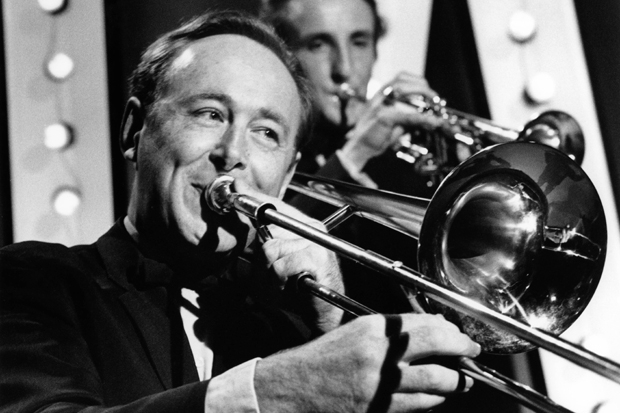Chris Barber, still going strong with his big band, was born in 1930. He heard jazz as a schoolboy on the radio programme Music While You Work and tried to find out more about this wonderful music. He soon discovered that, in his words, ‘black music was the real thing, although some white people managed it pretty well’.
By the time I became a secondary schoolboy in the 1950s, Chris Barber’s band was the sensation of the age. Chris played the trombone, sometimes switching to harmonica on blues numbers. He and his glamorous Northern Irish wife, Ottilie Patterson, seemed a golden couple. Ottilie had a superb voice for the blues, ancient or modern. She sounded like a classic blues singer of the 1920s, presenting a style that had died out in North America.
Barber and his band began by copying 1920s jazz, known in America as Dixieland and in England as trad. In time they were to use a trad line-up — trumpets, clarinet, trombone, banjo, drums and double bass — to play every type of what was then called ‘American negro music’ from spirituals to swing. Their love for this music not so much shines as gently glows from the pages of Barber’s somewhat restrained and accountant-like memoir. (He had set out to be an actuary before music beckoned.) Old-fashioned quiet decency distinguishes him from the usual run of sarcastic British jazzmen.
His music is not innovative but retrospective. He obviously wished to direct his fans towards the American originators. Marching music from New Orleans suited the Aldermaston marchers and trad became another word for Ban the Bomb. Left-wing protest has had a party atmosphere ever since.
To my mind Barber’s greatest achievement is his championing of the blues and gospel singers and musicians, whose careers have been revitalised as a result of having been brought to Britain by him. He made several trips to America, both to play music and to look for legendary performers. Without a thought of danger, disregarding ‘white folks’ warnings, he breezed into Harlem theatres and Chicago blues lounges, making friends wherever he went.
At a club called Smitty’s Corner on Chicago’s south side, Chris befriended the electric guitarist and blues singer Muddy Waters.In English jazz clubs at that time (the early 1960s) electric guitars were hated with sectarian passion as belonging to rock and roll. In England, encouraged by Barber, Muddy Waters played electrically. After some turmoil, English fans were won round with a vengeance.
The resultant craze for electric rock, at first called rhythm and blues, swept the land and at first consigned Trad jazz to oblivion. Barber lost popularity here, but gained a following on the continent. All the old rock singers now approaching their seventies owe their fame to Chris’s efforts — yea, even unto Mick Jagger and Elton. Open-air jazz festivals grew into rock festivals and the trad drink, Merrydown Cider (hence the tune ‘Merrydown Rag’), was replaced by illegal narcotics.
What an exciting book could be made out of the story of Chris Barber.This is not that book, but a meticulous series of concert diaries in which events hop from the 1950s to the 1990s as if nothing happened in between. The Ban the Bomb movement is not even mentioned. A modest, self-effacing man like Barber should not have written an autobiography. He is far too nice. Perhaps he should have taken a leaf from the book of his one-time banjo player, the vituperative Lonnie Donegan, the only celebrity who dared voice dislike of Bob Dylan. A bit of hate might have spiced up Jazz Me Blues. After all my favourite Ottilie and Chris Barber song is ‘I Hate a Man Like You’, also sung by my sister Zenga at various venues.
Available from the Spectator Bookshop, £18.99. Tel: 08430 600033






Comments